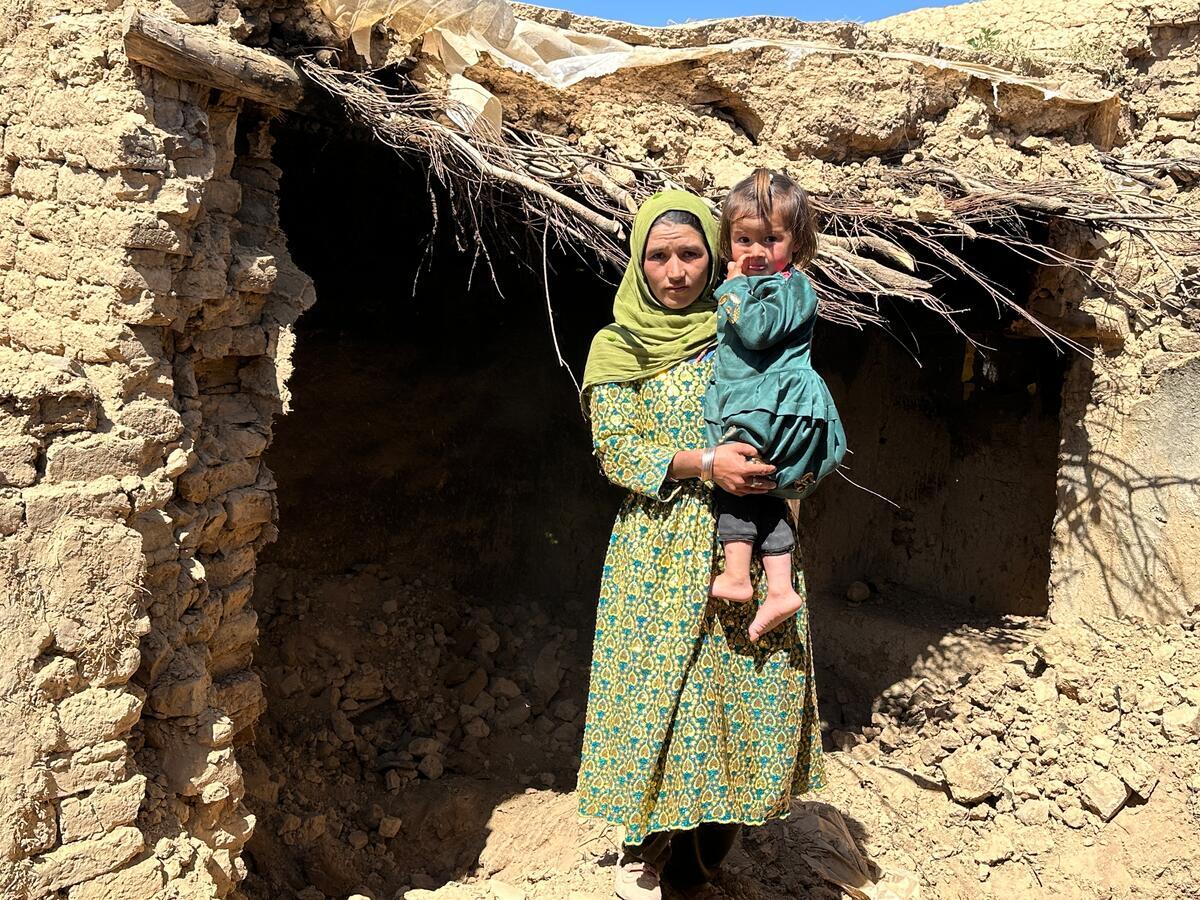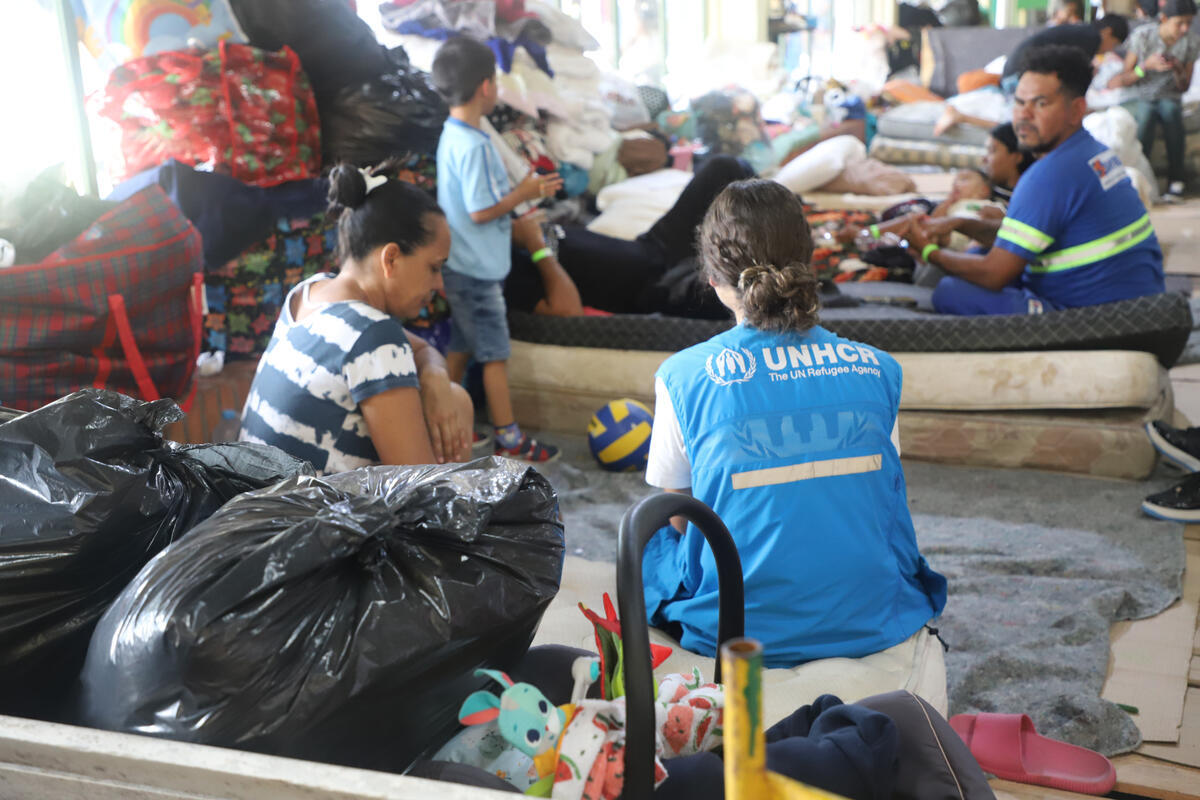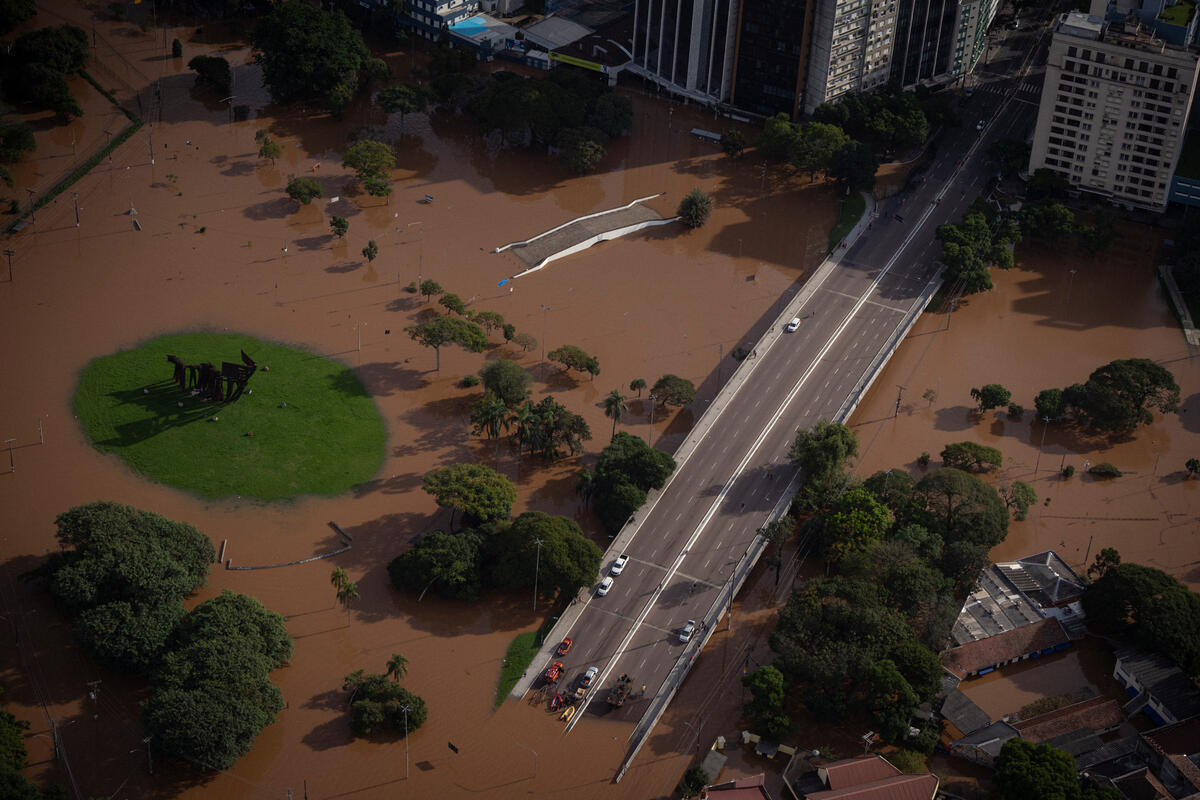Feature: Stranded Afghans find a better life at temporary site
Feature: Stranded Afghans find a better life at temporary site
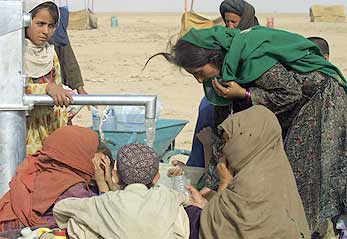
ZHARE DASHT, Afghanistan (UNHCR) - Abdul Aziz just arrived along a desert track that was marked with white stones to indicate which areas had been checked for mines. His family, caked in dust thrown up by the tyres, had emerged from the back of a truck to see a featureless powdery surface that stretched away into the distance until it blended into the sky.
"This is wonderful," said the Afghan who had fled with his family from the northern province of Jozjan, pumping the handle on one of the new wells installed at the desert site. "This is far better than the "waiting area".
That reaction can only be understood when you compare Zhare Dasht, the new settlement for displaced Afghans in the desert outside Kandahar, with the squalid "waiting area" encampment on the Pakistan border where he had spent the last six months.
It was not just the harsh conditions in a place where the only water was brought by tanker truck and 26,000 refugees were confined to the narrow space between the actual Afghan-Pakistan border and the line that is manned by Pakistan's border police.
Pakistan closed its borders to these Afghan refugees in February and blocked UNHCR assistance that might have led to the "waiting area" becoming a permanent refugee camp. Since then, the UN refugee agency has been allowed to truck in water and provide food, but the only shelter the government allowed the agency to provide was a small number of tents distributed to the most needy cases in June.
Médecins Sans Frontières (MSF) has provided medical aid to the Afghans stranded at Chaman, but a case of cholera discovered in mid-August underlined the danger of having so many people jammed into one inhospitable stretch of bare earth.
In summer the temperature rises above 40ºC, in winter it drops to minus 7ºC. Rain, never plentiful in this arid plain where Central Asia meets the subcontinent, has all but disappeared during a four-year drought. Dust, whipped up by an incessant wind and the constant movement of vehicles around the adjoining border towns of Chaman, Pakistan, and Spin Boldak, Afghanistan, envelopes the ragged tents.
"They face difficult conditions," said Tor-Eilif Emaus, head of UNHCR operations in the border area. "The main objective of this relocation is to offer them a safe place and better living conditions in a well-planned settlement inside Afghanistan."
He added, "The main advantage is that Zhare Dasht is safe, there is water available and they will be able to have a big property on which to settle down temporarily as they wait for the possibility to go to their own homes."
Emaus was overseeing the loading of another of the convoys to head out on the six-hour journey along the shattered highway to the southern Afghan city of Kandahar, a further 15 km towards the city of Herat and then 12 km off into the desert.
After taking representatives of the stranded Afghans on a "look and see" visit to the site, UNHCR received requests from 340 families to relocate. In less than two weeks, some 2,000 Afghans had shifted to Zhare Dasht and convoys continue to relocate people away from the inhospitable border encampment.
"We hope that when the first people move to Zhare Dasht and settle there, they will give positive feedback to the rest of the communities here," said Emaus.
Feedback has already begun to reach more of the Afghans stuck at Chaman, said one Afghan man.
"We hope by moving to the new camp in Zhare Dasht that we will get the assistance we have been promised," said Turjan, who left the south's Helmand province due to drought. "The living conditions here are so harsh - no other refugees in the world have lived in such miserable conditions as these. All we get here is water."
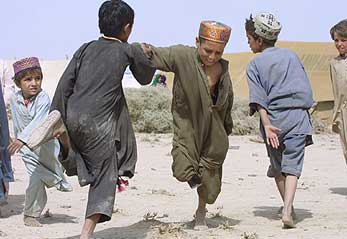
On arrival at the new interim settlement, the displaced Afghans are assigned a tent for the night and given food for an evening meal. The next morning, they are registered and given a 500-square-metre building plot and the tools needed to turn it into their temporary home - a tent, buckets, equipment to build a latrine. Food will be provided for at least the next six months.
Although the UN refugee agency is conducting further tests on the volume of water available, an initial study showed the area could eventually house 60,000 internally displaced - enough to take both those in the "waiting area" and at least 30,000 now in tents on the outskirts of neighbouring Spin Boldak. Despite the barren surface, the state-owned land had long been reserved for agricultural development.
There had been concerns that Zhare Dasht, like much of Afghanistan, was littered with land mines. De-mining crews did find 10 anti-tank mines, planted by mujahideen guerrillas in the area during their 1980s war with the Soviet occupation force in Afghanistan, but no anti-personnel mines. Further work to check for mines is planned.
Those moving to Zhare Dasht might also be discouraged by the current difficulty in reaching a large city where they can earn day wages - one advantage of the busy border - but that concern should ease with the planned surfacing of a road across the desert.
"The living conditions we have witnessed on the other side, compared to what we are offering them here - the gap is really very large," said Mohammad God Boudin, UNHCR head of the Zhare Dasht settlement. "There is always some hesitation to everything new, to everything strange. But since we already have some who have tested the waters, I'm sure the others will follow suit."
There will inevitably be some in the "waiting area" who may not want to leave.
Many ethnic Pashtun Afghans, who say they were driven from homes in the north of their country, want to stay on the Pakistan border in hopes that they will soon be able to move back directly without an interim stay in Zhare Dasht.
There may be others now stranded in the "waiting area" who would be at risk if they returned, such as vulnerable women or people fearing political persecution. UNHCR would likely screen those remaining and try to persuade Pakistan to allow that relatively small number to enter existing refugee camps.
The UN refugee agency says it will continue to help those in the "waiting area" to the extent possible, but there is little future there for anyone. Pakistan will not allow the entry of the thousands on the border and has said it intends to clear the encampment, which is described as an open route for smugglers.
Pushed by Pakistan and pulled by better living conditions at Zhare Dasht, the agency believes that most Afghans stranded on the border will opt for moving to the new settlement. UNHCR's Boudin, reporting a positive reaction from those who have already relocated to the temporary camp, expects the convoys of trucks hired by the agency to keep arriving across the desert.
"There's no comparison between Zhare Dasht and living at the border," said Abdul Nasir, who had fled with his family from Jozjan province to the border of Pakistan and was in the first group to relocate to Zhare Dasht. "Life was very difficult there. We faced so many problems. Here we are getting some food, and it's calm and peaceful."
By Jack Redden
UNHCR Islamabad

